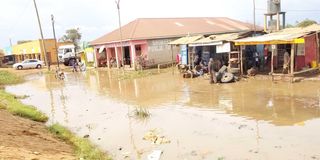Amuru leaders set to relocate flood victims

A flooded section of Elegu Town Council in Amuru District last week. PHOTO | MICHAEL OJOK
The Amuru District disaster management committee is finalising plans to evacuate at least 1,015 households from flood-prone areas in Elegu Town Council.
Mr Thomson Obong, the chief administrative officer, on Monday said they had recommended the evacuation of 12,600 residents to a 1km square piece of land belonging to the town council near Bibia barracks.
“We have identified that spot as a temporary holding site while other people can seek refuge at their relatives’ homes. The central government should also provide them with emergency relief, shelter, and non-food items ,” he said.
According to the committee’s assessment report conducted last week, since September 17, more than 15,000 people have been affected and nearly 3,000 are homeless.
The affected areas include Lorikowo East with 430 households, Lorikowo West (525), Kaladima East (85), and Bibia Ward (60).
Affected communities have since taken refuge in churches and schools while others crossed to neighbouring South Sudan.
According to the assessment report, at least 1,600 acres of food crops, including sesame, cassava maize, and watermelons, among others, were destroyed.
Mr Obong said the district also lacks funds to secure more land to resettle all the displaced persons.
Mr George Ocan, a committee member, said the biggest health threat now is the outbreak of diseases such as cholera and diarrhoea due to lack of clean water and poor garbage management.
“The people affected have not received any support from the government in terms of blankets, beddings, plates, saucepans and food supplements,” Mr Ocan said.
Mr David Otto, the chairperson of Elegu Trader’s Association, attributed the flooding to infrastructural developments that block the drainage systems.
Mr Raymond Luwita, the district engineer, called for creation of water channels.
“This river diverts here, but we can make it straight and widen the waterways. However, in the event that river overflows, you can make a network of canals to make a direct link to the Nile,” Mr Luwita said.




